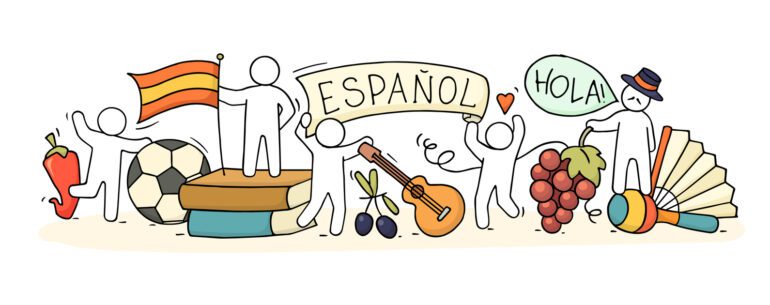Before we visited Mexico a few weeks ago, I told the wife I hadn’t spoken Spanish in so long, I wasn’t sure I’d remember any.
When it was game time and I was forced to speak Spanish—whether with the airline lady checking our bags or the shuttle driver who wanted a tip despite not lifting any luggage—Spanish seemed to naturally come out of my mouth. No propina para ti.
It felt like magic!
But it wasn’t magic. While learning Spanish I used The Pomodoro Technique, which is where you schedule breaks to help with focus and maximal retention.
This technique was discovered in Italy in the 1980s, but I didn’t know about it til my attempt to learn Español in my 30s. Somehow learning how to learn didn’t make it into the curriculum when I was in school. But thanks to the Internet, I envision a future where more tombstone epitaphs say “No excuses” instead of “Too soon old, too late smart.”
The Pomodoro method is simple. All you do is study in 25-minute intervals, followed by a short 5-minute rest.
I not only benefitted from studying in short intervals, but longer learning intervals help too. Longer learning breaks significantly improve your ability to retain information as your brain consolidates new memories.
And since we only visit Spanish-speaking countries once or twice a year, there are natural breaks built-in to when Español is needed. Although my long breaks aren’t deliberate, they’re nonetheless efficacious in helping to retain information. It’s like your brain needs time to catch up without you realizing what’s happening.
For more deliberate learning, I’d recommend total immersion in the language. At least initially.
In similar fashion, when asked whether someone should get a real estate license, I tell them not if you don’t plan to do it full-time to start. The only reason I had any success selling & investing in real estate as a “side-hustle” was because I first worked in real estate full-time [my first 4 years out of college]. That was enough time to equip myself with the knowledge needed to succeed without going into the office nearly everyday to ask for help.
Real estate school, like business school, doesn’t teach you much. For that matter, neither do language learning apps.
You can’t just use Duolingo when the exhaust fan is on and expect to learn a second language. But I’m convinced if you start with some sort of immersion training, it will lead to more productive trips to the throne.
Another cool thing. When you try to talk with someone who speaks a different language, you’re both communicating at a more involved and intimate level than when speaking in your native tongue. That’s because you’re studying each other, looking for body language cues, micro-facial expressions and other gestures.
You should never be nervous to practice the language you’re learning. Nobody cares how badly you speak it. In fact, they’ll generally appreciate your attempt to try to speak in their language.
As a result, you’ll often grow closer to that person and their culture, as you’re forced to listen closely to what they’re saying so that your reply makes sense.
If they talk too fast for you, which is inevitable, politely ask them to slow down. I say, “Mas lento por favor” all the time.
La Familia Modern
Visiting a place where you don’t speak the language can be intimidating. But rest assured, you can almost always find somebody who speaks English just about anywhere in the world.
The English language is often considered the language of the Internet & money. It’s spoken by ~17% of humans.
Ironically, even though you may speak the same language as locals, it’s still no guarantee you’ll understand them. Just ask my Houston friends when I take them to Thibodaux. Or my wife when we visited Argentina—she couldn’t understand a word of their Spanish.
But none of that is reason enough to avoid learning a second language. Plus, the younger you learn, the quicker and easier your brain will absorb it.
If you learn a 2nd language before puberty, you won’t have an accent. But if you learn a second language after puberty (and voice changes), you’ll always speak the 2nd language with the accent of your first. It’s why my wife, who learned English at 7 years old, doesn’t sound like Sofia Vergara.
Thus, my advice to young people is this: Don’t be like me—the sooner you learn a second language, the better. Start as young as possible.
We’ve all heard the proverb about the best time to plant a tree. It’s a saying I never liked because the second part is wrong. If the best time to plant a tree was 20 years ago, the next-best time to plant a tree isn’t today, it’s obviously 19 years and some days ago.
Here’s a more applicable proverb to your language learning efforts: “A society grows great when old men plant trees in whose shade they shall never sit.”
My motivation to learn Spanish isn’t about me. No, I see it as benefitting others. For example, I’ll have a bilingual kiddo with a chance to change our modern family árbol.
Keeping Your Mind Sharp
The upside of learning a new skill when you’re older is that it’s good for your brain. It keeps your mind sharp, and may reduce the risk of Alzheimer’s.
I don’t know exactly how studying Spanish has helped my brain, but I do know it’s affected the way I think, and the way I feel about myself.
Equally important, starting young means more time for exponential learning. As I’ve written before, basic knowledge is easily connected to other concepts and knowledge. Therefore, basic or ordinary knowledge [of a language], once combined, becomes extraordinary knowledge.
Let’s say, for instance, you learn 100 of the most commonly used palabras (words) in Spanish.
You now have a solid foundation to work with. Then as your base of knowledge grows, you’ll learn new words and concepts faster. And “new” knowledge won’t seem so new.
Gracias por leer y adios, amigos!




Leave a Reply